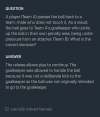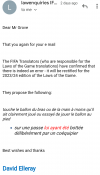This is one of the many, many examples in the law where the referee is absolutely required to judge intent.
As
@one points out, the law uses the words "deliberate" (or "deliberately") nearly 40 times - this is just one of them.
To judge this the way several people seem to be saying they would, means that you are rewriting the law, in effect taking out the words "to the goalkeeper" and making it read that it is an offence for the goalkeeper to touch the ball with the hands after it has been deliberately kicked by a team-mate (which would still, by the way, require you to make a judgement on intent, just on a slightly different aspect of things).
The law here absolutely requires a referee to make a judgement on whether the player intended the ball to go to their goalkeeper. You may not like it - you may say it requires you to be "a mind reader" (though I think that's an unhelpful phrase - the law simply asks you to make a judgement on intent, as many other parts of the law do) but it's what the law instructs us to do.
As the obviously ironic phrase goes, "That's why they pay us the big bucks."

I've said this in discussions about this several times before, but I like to borrow the phraseology from FIFA circular 488 here, which while it wasn't intended for the deliberate kick to a goalkeeper scenario but the related "circumvention" law is still (IMHO) entirely apt in this scenario.
The phrase in question is that:
So for me, if the referee is not convinced that the player intended the ball to go to their goalkeeper, there is no offence here.







